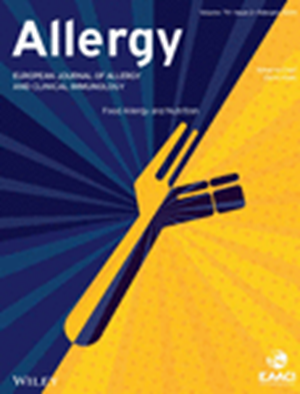Long-Term, Real-World Effectiveness of Allergen Immunotherapy in Children and Adolescents With Allergic Rhinitis and Asthma.
IF 12
1区 医学
Q1 ALLERGY
引用次数: 0
Abstract
BACKGROUND Respiratory allergies often begin in childhood and can progress over time, leading to increased disease burden. Allergen immunotherapy (AIT) is the only causal treatment for allergic respiratory diseases with disease-modifying potential. While randomised trials support its efficacy in controlling allergic rhinitis (AR) and asthma symptoms, long-term real-world data in children remain limited. METHODS This paediatric study (n = 11,036) was conducted within the pre-defined framework of the REACT study, based on protocol-specified objectives. Children (< 18 years) with physician-diagnosed AR, with or without pre-existing asthma, were included. AIT-treated patients were matched 1:1 to non-AIT controls. Effectiveness was assessed over 9 years by comparing AR and asthma medication prescriptions, using a public database covering all reimbursable AIT products. Relative differences were calculated across the full observation period. RESULTS AIT-treated children (mean age 11.4 years; 62.1% male) exhibited greater reductions in AR medication use than controls (additional 9% reduction beyond 61% in controls). In children with asthma, AIT was associated with additional reductions in asthma medication use (-21% beyond -48% in controls), severe exacerbations (-21% beyond -36%), and new oral corticosteroid prescriptions (-33% beyond -41%). Age stratification revealed more pronounced AR medication reductions in younger children (0-11 years) than in adolescents (12-17 years). CONCLUSION This large-scale, real-world study supports the long-term effectiveness of AIT in children with AR, with or without asthma. The findings reflect improved disease control and suggest a disease-modifying effect of AIT. Early intervention, particularly in younger children, may help mitigate the progression of allergic disease.过敏原免疫治疗对儿童和青少年变应性鼻炎和哮喘的长期、实际疗效。
呼吸道过敏通常始于儿童时期,并可能随着时间的推移而发展,导致疾病负担增加。过敏原免疫疗法(AIT)是唯一的因果治疗过敏性呼吸道疾病与疾病改善的潜力。虽然随机试验支持其在控制过敏性鼻炎(AR)和哮喘症状方面的有效性,但儿童的长期真实数据仍然有限。方法本儿科研究(n = 11036)在REACT研究的预定义框架内进行,基于协议指定的目标。纳入了医生诊断为AR的儿童(< 18岁),无论是否存在哮喘。ait治疗的患者与非ait对照组1:1匹配。使用涵盖所有可报销的AIT产品的公共数据库,通过比较AR和哮喘药物处方,评估了9年的有效性。计算整个观察期的相对差异。结果接受sait治疗的儿童(平均年龄11.4岁,62.1%为男性)的AR药物使用比对照组有更大的减少(在对照组61%的基础上再减少9%)。在患有哮喘的儿童中,AIT与哮喘药物使用的额外减少(-21%,对照组为-48%)、严重恶化(-21%,对照组为-36%)和新的口服皮质类固醇处方(-33%,对照组为-41%)相关。年龄分层显示,年龄较小的儿童(0-11岁)比青少年(12-17岁)的AR药物减少更明显。结论:这项大规模的真实世界研究支持AIT在伴有或不伴有哮喘的AR儿童中的长期有效性。这些发现反映了疾病控制的改善,并提示了AIT的疾病改善作用。早期干预,特别是在年幼的儿童中,可能有助于缓解过敏性疾病的进展。
本文章由计算机程序翻译,如有差异,请以英文原文为准。
求助全文
约1分钟内获得全文
求助全文
来源期刊

Allergy
医学-过敏
CiteScore
26.10
自引率
9.70%
发文量
393
审稿时长
2 months
期刊介绍:
Allergy is an international and multidisciplinary journal that aims to advance, impact, and communicate all aspects of the discipline of Allergy/Immunology. It publishes original articles, reviews, position papers, guidelines, editorials, news and commentaries, letters to the editors, and correspondences. The journal accepts articles based on their scientific merit and quality.
Allergy seeks to maintain contact between basic and clinical Allergy/Immunology and encourages contributions from contributors and readers from all countries. In addition to its publication, Allergy also provides abstracting and indexing information. Some of the databases that include Allergy abstracts are Abstracts on Hygiene & Communicable Disease, Academic Search Alumni Edition, AgBiotech News & Information, AGRICOLA Database, Biological Abstracts, PubMed Dietary Supplement Subset, and Global Health, among others.
 求助内容:
求助内容: 应助结果提醒方式:
应助结果提醒方式:


